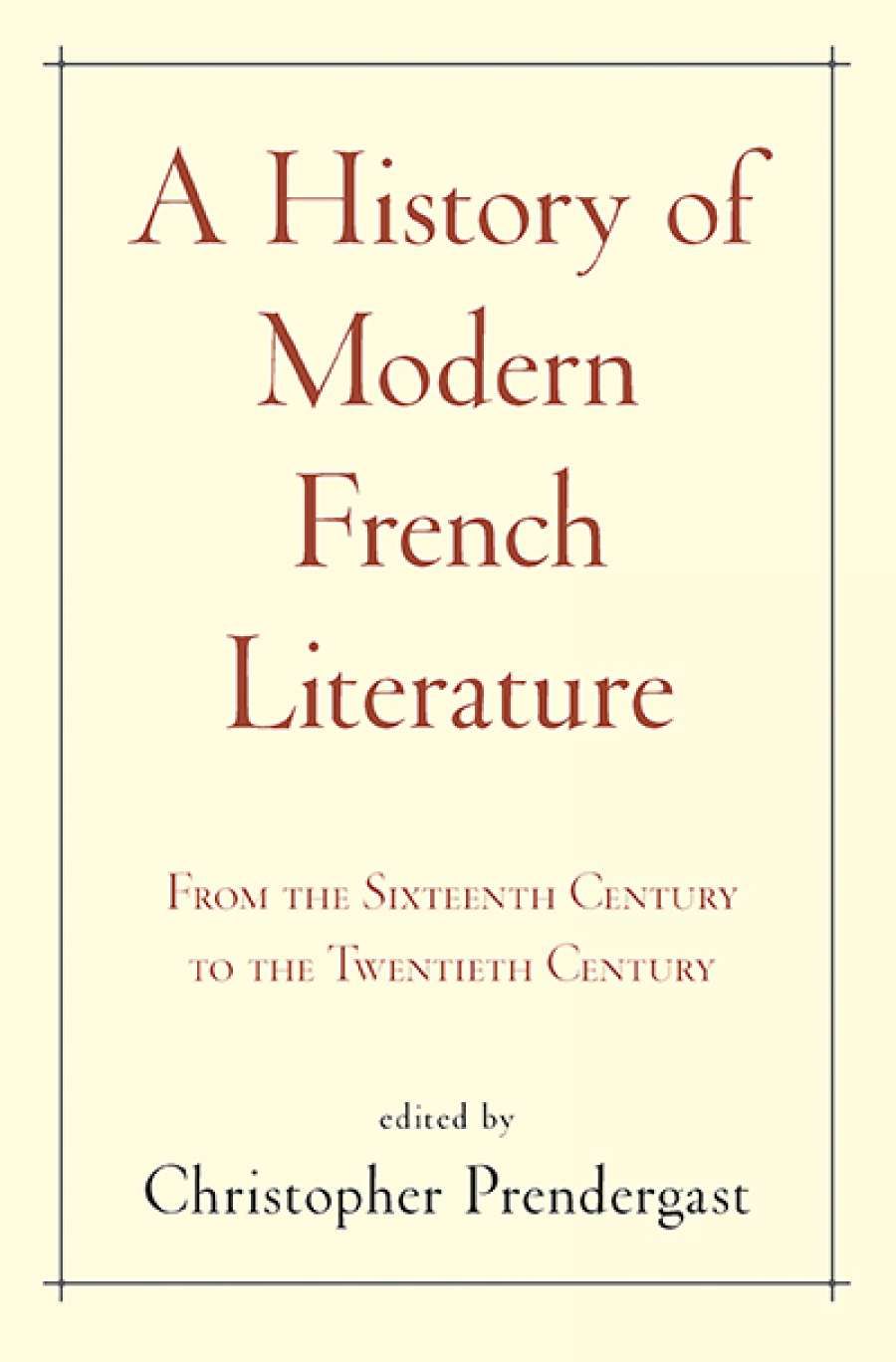
- Free Article: No
- Contents Category: Literary Studies
- Custom Article Title: Colin Nettelbeck reviews 'A History of Modern French Literature: From the sixteenth century to the twentieth century' edited by Christopher Prendergast
- Book 1 Title: A History of Modern French Literature
- Book 1 Subtitle: From the sixteenth century to the twentieth century
- Book 1 Biblio: Princeton University Press (Footprint), $98 hb, 736 pp, 9780691157726
Despite the shaky framework, Prendergast has gathered an impressive group of contributors from Britain, Ireland, and North America, many of whom are deservedly renowned literary historians. Not all of them meet the book’s ambition to be accessible to a general public: some succumb quite badly to the temptation faced by many academics – to demonstrate their erudition through specialised language and stiflingly numerous allusions and references. But a good majority of the individual essays are outstanding, often brilliant, and serve as heartening evidence for the continuing vitality of French literary studies around the world today. Some do this by showing how the historical specificities of a particular author or work meld with pertinence for present-day readers. Hassan Melehy, for example, of the University of North Carolina, joins a very current debate through his reflection on Joachim du Bellay’s sixteenth-century argument for a renewal of French literature through transnational and multilingual borrowing – that is, the adoption of a principle of openness to external influence, rather than a cringing defensiveness. Susan Maslan (Berkeley) explores analogies between the psychological and socio-political concerns of eighteenth-century playwrights Marivaux and Beaumarchais and contemporary issues of power and gender. Joanna Stalnaker (Columbia), through an insightful examination of Rousseau’s Confessions and Promenades, raises many engaging points and questions about the now familiar and pervasive genre of writing of the self.
In other instances, some of the great figures of the French literary canon have stimulated inspired new interpretations: Timothy Hampton (Berkeley) on Montaigne, Nicholas Cronk (Oxford) on Voltaire, and Michael Lucey (Berkeley) on Proust all make for rewarding, thought-provoking reading. Roger Pearson (Oxford) uses Mallarmé’s celebrated A Throw of the Dice (1897) as a starting point for a masterly and scintillating review of French poetic practice from the French Revolution into the twentieth century.
Further diversity, both entertaining and instructive, occurs in various pieces scattered across the collection. Larry F. Norman (Chicago) turns the late-seventeenth-century Quarrel of the Ancients and the Moderns into a prism through which to project an account of the tectonics at work in the formation of French cultural identity from the Middle Ages to the Romantic period; Catriona Seth (Oxford) mounts a compelling argument showing that male-dominated historical neglect of the voices of many significant eighteenth-century women has produced serious distortion of what Enlightenment France was; Jean-Michel Rabaté (University of Pennsylvania) – perhaps somewhat paradoxically for a professor of English – seeks (in my view successfully) to explain why we should consider Samuel Beckett principally as a French writer.
 Marcel Proust in 1895
Marcel Proust in 1895
(photograph by Otto Wegener, Wikimedia Commons)As David Coward points out, a persistent thread found in many of the essays is the relationship between literary production and political power. It is particularly evident in two pieces that analyse so-called ‘francophone’ literature – the very substantial body of work from those parts of the world which were once part of the French empire. This is a rich field, and a fraught one, where the use of French by writers who are often seeking to expose the debilitating and destructive effects of colonial rule simultaneously exposes their work to appropriation by the ‘mother’ culture in its nostalgic desire to affirm its continuing global relevance and reach. Both Mary Gallagher (University College Dublin), in her overview of the work of Aimé Césaire, and Nicholas Harrison (King’s College London), in his study of Assia Djebar and the ‘birth’ of francophone literature, illuminate the complexities, contradictions, and achievements of this field with admirable lucidity.
In sum, while this book does not provide the unified historical overview promised in the title, most of its essays, which all come with a bibliography and suggestions for further reading, offer informed and original insights into many of the major figures and movements of the French literary tradition, as well as others who are less well known or who have been forgotten. Given its price, it is perhaps more likely to be purchased by libraries than by individuals, but it will be of interest and value to a wide range of cultivated readers.


Comments powered by CComment